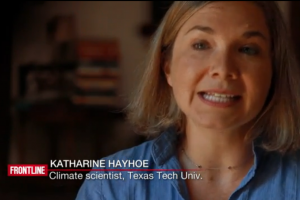Essay by Katharine Hayhoe, Climate Scientist, Texas Tech University, Lubbock, TX
Reference: Science 01 Jun 2018: Vol. 360, Issue 6392, pp. 943
Science is based on a shared respect for the scientific method — the principle that, by gathering and analyzing data and information, scientists and others can draw conclusions that are robust and generalizable across cultures and ideologies. Scientists furthermore assume that disagreements can be resolved by more facts. So when people object to the reality of climate change with science-y sounding arguments—“the data is wrong,” or “it’s just a natural cycle,” or even, “we need to study it longer”—the natural response of scientists is simple and direct: People need more data. But this approach often doesn’t work and can even backfire. Why? Because when it comes to climate change, science-y sounding objections are a mere smokescreen to hide the real reasons, which have much more to do with identity and ideology than data and facts.
“…changing minds…requires…practical, viable, and attractive solutions that someone can get excited about.”
For years, climate change has been one of the most politically polarized issues in the United States. Today, the best predictor of whether the public agrees with the reality of anthropogenic climate change is not how much scientific information there is. It’s where each person falls on the political spectrum. That’s why the approach of bombarding the unconvinced with more data doesn’t work — people see it as an attack on their identity and an attempt to change their way of life.
I am a climate scientist who has spent a lot of time trying to make climate science more accessible. I’ve authored National Climate Assessments and numerous outreach reports; I host a YouTube show called Global Weirding; I tweet; I’ve even promoted knitting patterns that display rising temperatures. Yet the most important step I’ve taken to make my science communication more effective has nothing to do with the science. As uncomfortable as this is for a scientist in today’s world, the most effective thing I’ve done is to let people know that I am a Christian. Why? Because it’s essential to connect the impacts of a changing climate directly to what’s already meaningful in one’s life, and for many people, faith is central to who they are.
Scientists can be effective communicators by bonding over a value that they genuinely share with the people with whom they’re speaking. It doesn’t have to be a shared faith. It could be that both are parents, or live in the same place, or are concerned about water resources or national security, or enjoy the same outdoor activities. Instead of beginning with what most divides scientists from others, start the conversation from a place of agreement and mutual respect. Then, scientists can connect the dots: share from their head and heart why they care.
Talking about impacts isn’t enough, though. Sadly, the most dangerous myth that many people have bought into is, “it doesn’t matter to me,” and the second most dangerous myth is, “there’s nothing I can do about it.” If scientists describe the daunting challenge of climate change but can’t offer an engaging solution, then people’s natural defense mechanism is to disassociate from the reality of the problem. That’s why changing minds also requires providing practical, viable, and attractive solutions that someone can get excited about. Concerned homeowner? Mention the amazing benefits of energy conservation. Worried parent? Bring up the practical steps to take to make outdoor play spaces safer for kids, even in the hot summer. Business executive? Talk about the economic benefits of renewables.
We all live on the same planet, and we all want the same things. By connecting our heads to our hearts, we all can talk about — and tackle — the problem of climate change together.
>>> Katharine Hayhoe is a professor and director of the Climate Science Center at Texas Tech University, Lubbock, TX, USA. See also: www.katharinehayhoe.com

